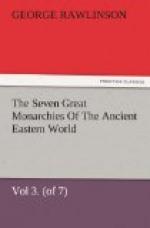The other notice is furnished by Berosus. That remarkable historian, in his account of the early dynasties of his native Chaldaea, declared that, at a date anterior to B.C. 2000, the Medes had conquered Babylon by a sudden inroad, had established a monarchy there, and had held possession of the city and neighboring territory for a period of 224 years. Eight kings of their race had during that interval occupied the Babylonian throne, It has been already observed that this narrative must represent a fact. Berosus would not have gratuitously invented a foreign conquest of his native land; nor would the earlier Babylonians, from whom he derived his materials, have forged a tale which was so little flattering to their national vanity. Some foreign conquest of Babylon must have taken place about the period named; and it is certainly a most important fact that Berosus should call the conquerors Medes. He may no doubt have been mistaken about an event so ancient; he may have misread his authorities, or he may have described as Medes a people of which he really knew nothing except that they had issued from the tract which in his own time bore the name of Media. But, while these axe mere possibilities, hypotheses to which the mind resorts in order to escape a difficulty, the hard fact remains that he has used the word; and this fact, coupled with the mention of the Medes in the book of Genesis, does certainly raise a presumption of no inconsiderable strength against, the view which it would be natural to take if the Zendavesta and the Assyrian annals were our solo authorities on the subject. It lends a substantial basis to the theories of those who regard the Medes as one of the principal primeval races; who believe that they were well known to the Semitic inhabitants of the Mesopotamian valley as early as the twenty-third century before Christ—long ere Abraham left Ur for Harran; and that they actually formed the dominant power in Western Asia for more than two centuries, prior to the establishment of the first Chaldaean kingdom.
And if there are thus distinct historical grounds for the notion of an early Median development, there are not wanting these obscurer but to many minds more satisfactory proofs wherewith comparative philology and ethnology are wont to illustrate and confirm the darker passages of ancient history. Recent linguistic research has clearly traced among the Arba Lisun, or, “Four Tongues” of ancient Chaldaea, which are so often mentioned on the ancient monuments, an Arian formation, such as would naturally have been left in the country, if it had been occupied for some considerable period by a dominant Arian power. The early Chaldaean ideographs have often several distinct values; and when this is the case, one of the powers is almost always an Arian name of the object represented. Words like nir, “man”, ar, “river,” (compare the names Aras, Araxes, Endanus, Rha, Rhodanus, etc., the Slavonic rika, “river,” etc.), san, “sun,”




